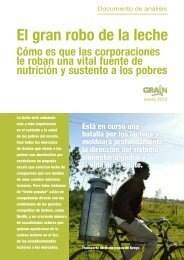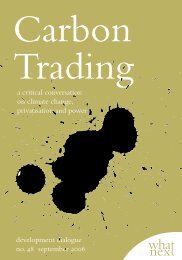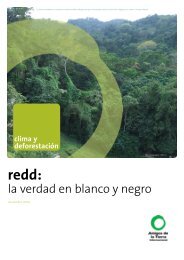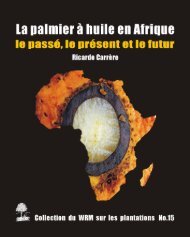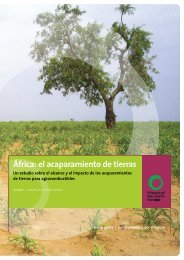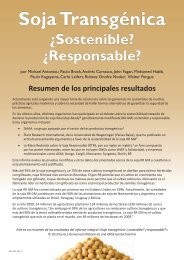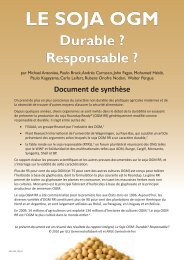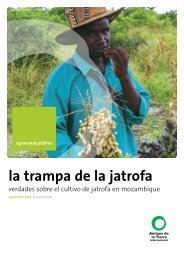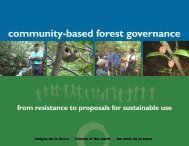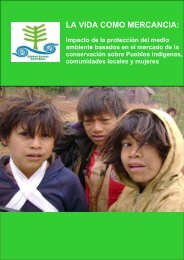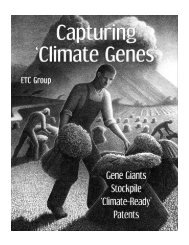Plantations, poverty and power - Critical Information Collective
Plantations, poverty and power - Critical Information Collective
Plantations, poverty and power - Critical Information Collective
Create successful ePaper yourself
Turn your PDF publications into a flip-book with our unique Google optimized e-Paper software.
62<br />
A recent study by WWF, Remote Sensing Solution GmbH <strong>and</strong> Hokkaido University found that the forest<br />
destruction in Riau province for conversion to oil palm <strong>and</strong> pulpwood plantations generates more annual<br />
greenhouse gas emissions than the total emissions in the Netherl<strong>and</strong>s. Riau’s peatl<strong>and</strong>s probably hold<br />
South-east Asia’s largest store of carbon. WWF notes that “[Riau] also has Indonesia’s highest<br />
deforestation rate, substantially driven by the operations of global paper giants Asia Pulp & Paper (APP)<br />
<strong>and</strong> Asia Pacific Resources International Holdings Limited (APRIL).” 308<br />
WWF’s report found that more than four million hectares of forest has been destroyed in Riau province in<br />
the last 25 years. 309 Driving this destruction are two plantation industries: oil palm <strong>and</strong> pulpwood. Indah<br />
Kiat alone requires 9.8 million cubic metres of wood a year, to keep its two million tonnes pulp mill<br />
operating. In 2004, according to CIFOR’s Chris Barr, APP’s plantations supplied only between 50 <strong>and</strong> 60<br />
per cent of Indah Kiat’s raw material needs. 310<br />
APP frequently puts out statements claiming that its operations are harmless: “APP is committed to<br />
purchasing wood fiber for its pulp- making operations from sustainably-managed forestry sources, which<br />
conserve areas of outst<strong>and</strong>ing habitat <strong>and</strong> which operate in harmony with local communities.” 311<br />
WWF Indonesia attempted to work with APP to ensure that the company surveyed their concessions for<br />
High Conservation Value Forests. But after WWF Indonesia had signed an agreement with the company,<br />
APP’s Anil Raina told researchers from Swedwatch that preserving High Value Conservation Forests in<br />
APP’s concessions would be difficult. “There is a limit to how much we can conserve”, he said. “Then<br />
we would need alternative sources!” 312<br />
APP produced a Sustainability Action Plan, which “shows that APP has integrated some of WWF’s<br />
dem<strong>and</strong>s but disappointingly has not addressed some of the conservation organisation’s basic concerns,”<br />
notes WWF Indonesia. Among the issues not addressed was protection of forests with high conservation<br />
value. By mid-2004, the WWF-APP agreement had unravelled <strong>and</strong> WWF wrote to APP’s major buyers in<br />
Asia, the US <strong>and</strong> Europe asking them to “immediately review their relationships” with APP. 313<br />
Several companies have stopped buying paper from APP, including Woolworths in Australia 314 <strong>and</strong><br />
http://www.newscientist.com/channel/opinion/mg19626321.600-bog-barons-indonesias-carbon-catastrophe.html<br />
308 “Destruction of Sumatra forests driving global climate change <strong>and</strong> species extinction: WWF”, WWF US press<br />
release, 26 February 2008. http://www.worldwildlife.org/who/media/press/2008/WWFPresitem7039.html<br />
309 “Deforestation, Forest Degradation, Biodiversity Loss <strong>and</strong> CO 2 Emissions in Riau, Sumatra, Indonesia”, WWF<br />
Indonesia Technical Report, 27 February 2008.<br />
http://www.worldwildlife.org/who/media/press/2008/WWFBinaryitem7625.pdf<br />
310 Christopher Barr (2004) “Risk Analysis <strong>and</strong> Impact Assessment for Pulp <strong>and</strong> Plantation Investments: The Case of<br />
Indonesia”, presentation at International Forum on Finance <strong>and</strong> Investment in China’s Forestry Sector, Center for<br />
International Forestry Research (CIFOR), Beijing, 22-23 September 2004.<br />
311 “APP Refutes Allegations by Eyes on the Forest”, APP Official Statement, 5 July 2007.<br />
312 Mats Valentin <strong>and</strong> Kristina Bjurling (2004) “Swedish involvement in the Indonesian paper <strong>and</strong> pulp industry”,<br />
SwedWatch, October 2004, page 14.<br />
313 James Rose (2004) “WWF asks APP’s customers to buy their paper elsewhere”, Ethical Corporation, 23 July 2004.<br />
http://www.ethicalcorp.com/content.aspContentID=2424<br />
314 Helen Morris (2008) “APP defiant despite losing Woolworths contract over environmental allegations”,<br />
printweek.com, 8 August 2008. http://www.printweek.com/paper/news/838307/APP-defiant-despite-losing-Woolworthscontract-environmental-allegations/



